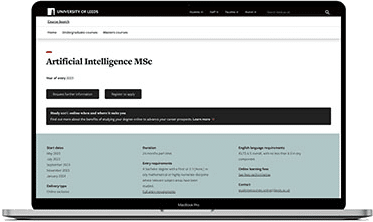Meet the Programme Lead for Artificial Intelligence
Artificial Intelligence
Dr Abdulrahman Altahhan is the Programme Lead for the online Artificial Intelligence MSc delivered by the University of Leeds, and a Senior Teaching Fellow in Artificial Intelligence within the Leeds School of Computing. With over 15 years of experience in the unique and ground-breaking world of artificial intelligence, he’s passionate about helping the next generation of AI experts.
In this Q&A, we explore his specialist interest in deep reinforcement learning, what it means to be a part of the University of Leeds, and his top tips for studying on the course.
Learn more about our Artificial Intelligence courseQ: Could you tell us a little bit more about your experience and how you got to where you are today?
I have a Masters in expert systems and fuzzy logic which I studied at Damascus University in Syria which followed my undergraduate degree in mathematics and informatics. Following this, I specialised in machine learning and reinforcement learning by graduating with a PhD in 2009 from the University of Sunderland in the UK, and since then I have worked in multiple posts that are all related to artificial intelligence.
Before joining Leeds, I worked as a Programme Director for an MSc in Data Science and Computational Intelligence at Coventry University teaching all topics of AI from machine learning to neural networks. And now, at the University of Leeds, I am module leader for the Reinforcement Learning and Robotics as well as the Data Science modules. I have developed materials and content for the Machine Learning, the Programming for Data Science modules and have been involved in the several other aspects of the programme which made me aware of all aspects of the programme. And here I am leading the online programme itself.
Q: Why artificial intelligence? Where does your passion for this subject stem from?
At one point in my career, I stopped and reflected on what I could do next that would be relevant for the next 50 years or so, and the one thing that I thought was going to stay relevant for the foreseeable future is artificial intelligence.
AI started in the 1950s, but it was seen to offer false promises in the field and people were sceptical about it. But when I started this specialisation in 1999, I decided to go into AI because I believed that this was the future, whereas many other technology professionals would go into more topical areas such as networking, software engineering and development as it was more in-demand.
For me, I wanted something a little bit more eccentric and exciting. I wanted to explore something ground-breaking, innovative and creative. Then, when you implement it and see the successful impact it’s having, it’s really thrilling, and I cannot over-emphasise the excitement I get from this.
Q: What would you say is your main area of expertise within AI and do you have any research interests?
Yes, my main area of AI is reinforcement learning and more specifically, deep reinforcement learning. The deep side comes from using deep neural networks alongside reinforcement learning, and it is currently one of the hottest topics in AI.
Reinforcement learning is about equipping any virtual or physical agent (e.g., a robot) to be able to exhibit intelligence, so that it can act and interact with the environment to achieve a specific task. We try to let the AI agent learn to operate in an environment by itself, and then, by training for multiple episodes and repeating the same task many times, eventually, it will learn to perform the task (e.g., to navigate) and adapt to changing environments. It should still be autonomous and resilient enough to changes, but if it is not, then we simply retrain the agent rather than reprogram it for the task.
Q: Tell us a little bit more about the online Artificial Intelligence Masters delivered by the University of Leeds.
The course is very practical. When we designed the modules, we always ensured that there was a practical element as we believe people learn by doing rather than just being taught. I am a big believer in interactivity, and I think it’s one of the most critical aspects of teaching and contributes to the success of our modules and the course. Similarly, employability is also a key consideration of the course and we have designed it to equip our students with the skills that are relevant in the current market.
Q: The course is taught fully online. What is that like? And how much interaction do you have with the students?
The course is fully online but as academics, we all have plenty of opportunities to interact with the students. Firstly, we have a weekly live online seminar where students can interact with their tutor and ask questions about the course content.
As all the course materials are available online including videos, exercises and guided discussions, students can study at their own pace too. They can interact with their peers through open-ended discussion forums where, again, there is the opportunity to ask questions and learn from other perspectives.
The online nature of the course is very convenient as students can be in any part of the world and still study alongside work and life commitments.
Learn more about the benefits of online learning with LeedsQ: What are you hoping for students to get out of the course?
We are hoping for them to gain a well-rounded skillset that prepares them for the AI industry and helps them take on AI research in new areas. We also want them to gain the skills that will help them implement and take these ideas into applications where they can benefit society and flourish in their own careers. When students join, they don’t necessarily need to have a background in AI – they can come from other technology areas like computer science or engineering – but by studying the course, we want to bring their skills up to date and transform them into AI experts.
Q: Why did you choose to join the University of Leeds School of Computing?
I joined the Leeds School of Computing as it is one of the leading schools for AI research in the UK, and there’s all sorts of fascinating research going on in the school that will feed into the course.
All the faculty members that are teaching on the course are active researchers and therefore up to date with the latest technologies and state-of-the-art achievements in the area. I think that’s important because AI is a field that’s fast paced, and therefore the course content needs to be current and relevant to the real-world challenges in AI. It is developed by faculty academics who are actively involved in research and I didn’t think twice about applying to the University of Leeds, as it’s fantastic in that respect.
Q: Could you tell us about some of the research projects underway at the Leeds School of Computing?
Reinforcement learning is being used in many areas such as robotics and gaming. Within gaming, we are training an agent to game by itself so it will learn to defeat another game agent or even against itself. You can train reinforcement learning to achieve superhuman intelligence in chess or the game of ‘Go’ by allowing it to play against itself millions of times to achieve a higher level of intelligence than humans. It started to get a bit frightening for people when it exceeded human capabilities which we investigate in our Artificial Intelligence course through the Ethics of Artificial Intelligence module.
Learn more about the Deep Reinforcement Learning on Games research project
We have also used reinforcement learning to train models to understand signals coming from muscles. So, for example, for amputees or people with disabilities who cannot move their arms, we’ve uncovered how to train models to understand and respond to human muscle signals and activate them. And that opens all sorts of opportunities for humanity which is very exciting.
Learn more about the Machine Learning and Deep Learning for Myoelectric Control research project
Q: And what about some of the faculty’s partnerships – how do they benefit the course?
We have active partnerships with The Alan Turing Institute, several other universities such as Durham and Sheffield, and health-related organisations too including the NHS. These partnerships put us at the forefront of what is going on both nationally and internationally and the learnings we acquire from them benefit the course by keeping it current. The partnerships also provide opportunities to get involved with relevant research projects.
Discover our partnership with The Alan Turing InstituteQ: What have some of the previous graduates of the School of Computing gone onto?
We have an extremely high level of employability, and the course is designed to be very appealing to both students and employers in all sorts of fields. AI is penetrating several aspects of life now, and students are going onto roles with exceptionally good salaries, or into further research through PhD work or other academic pursuits. We are seeing a shortage of AI specialists with the right skills across industries, so currently students have no problem securing employment upon graduation.
Q: If you could give one piece of advice to someone considering studying Artificial Intelligence with the University of Leeds, what would it be?
To be able to take full advantage of this online course, students should take responsibility to keep themselves on track by fully engaging with each module. Each module is run independently for two months to allow students to focus solely on one topic which is helpful to stay engaged. I would recommend that students get involved, be active and participate in the course. The more you invest in the course, the more you get out of it.
At the end of this MSc course, there is a comprehensive project where students can pick a project idea from a range of topics and execute it from scratch or even pursue a new idea of their own if deemed suitable. This is a good opportunity to create something from the ground up, apply it to a real-life challenge and take advantage of the support and expertise of their supervisory team. Students can also speak to the tutors about career advice at any stage of the programme.
Q: Do you have anything to add that we haven’t covered so far?
I would like to wish all our current and prospective students all the best in their future endeavours, and I am confident that they will find the course interesting and useful for their careers.

Did you enjoy this blog? Here’s some related artificial intelligence content that you may be interested in:

Want to learn more about our online Artificial Intelligence course?
Check out the course content and how to apply.

